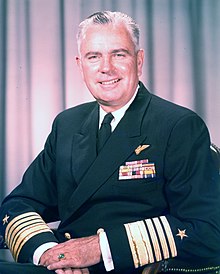George W. Anderson | |
|---|---|
 | |
| Chair of the President's Intelligence Advisory Board | |
| In office May 1, 1970 – March 11, 1976 | |
| President | Richard Nixon Gerald Ford |
| Preceded by | Maxwell D. Taylor |
| Succeeded by | Leo Cherne |
| United States Ambassador to Portugal | |
| In office October 22, 1963 – June 1, 1966 | |
| President | John F. Kennedy Lyndon B. Johnson |
| Preceded by | Charles Elbrick |
| Succeeded by | Tapley Bennett |
| Chief of Naval Operations | |
| In office August 1, 1961 – August 1, 1963 | |
| President | John F. Kennedy |
| Deputy | Claude V. Ricketts |
| Preceded by | Arleigh Burke |
| Succeeded by | David L. McDonald |
| Personal details | |
| Born | December 15, 1906 New York City, U.S. |
| Died | March 20, 1992 (aged 85) McLean, Virginia, U.S. |
| Education | United States Naval Academy (BSc) |
| Military service | |
| Branch/service | United States Navy |
| Years of service | 1927–1963 |
| Rank | Admiral |
| Commands | Chief of Naval Operations United States Sixth Fleet Carrier Division 6 Task Force 77 USS Franklin D. Roosevelt USS Mindoro |
| Battles/wars | World War II Cold War |
| Awards | Navy Distinguished Service Medal (2) Legion of Merit Bronze Star Medal |
George Whelan Anderson Jr. (December 15, 1906 – March 20, 1992) was an admiral in the United States Navy and a diplomat. Serving as the Chief of Naval Operations between 1961 and 1963, he was in charge of the US blockade of Cuba during the 1962 Cuban Missile Crisis.